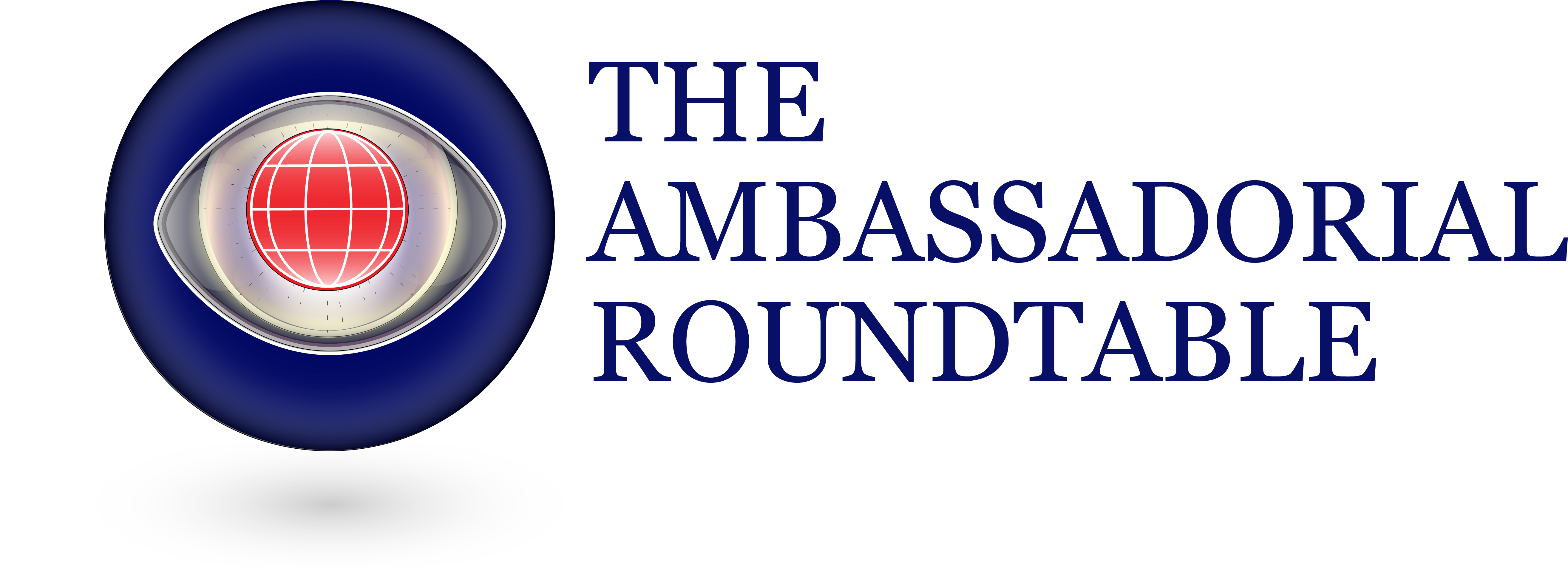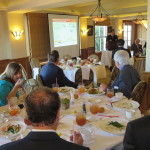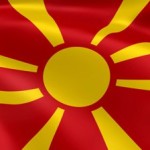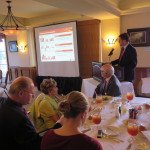The Internet of Things: Big Progress or Big Brother?
By Rebecca Benest, Intern Ambassadorial Roundtable
In a world where we’re becoming increasingly dependent on our devices, new technological developments now called the Internet of Things, or IoT, could completely change the way we see technology and our world. On a daily basis, most of us use technology to continuously check email, send messages, instantaneously communicate across the world, count our calorie intake, and check the news, among other things. A wife at work who wants an errand run can easily call, text, email, or Face Time her spouse with a favor. But what if this became unnecessary? What if the same spouse, who wanted the lawn watered, didn’t need to ask anyone at all? What if her house was measuring the water in the soil, and in accordance with the predicted rain in the upcoming days, communicated with the watering system to keep the soil perfectly watered without wife, spouse, or child lifting a finger? This is the idea of the Internet of Things. Creating a “smart” house, or a “smart” city, opens us up to an endless amount of possibilities. As the mass gathering of personal data becomes a reality, however, there are dangers and concerns just as real.
The Internet of Things, instead of harnessing communication between machines, harnesses sensors. The sensors essentially gather and evaluate data; they can then communicate with a myriad of machines, throughout a house or a city, and can control the machines based on the data gathered. This is related to Cloud-based applications, which are constantly collecting similar information. The difference here is that our possibilities widen when the sensors are connected to our phones, cars, all the appliances in our homes, or the stoplights on every street. All these devices become one harmonious system, one massive machine coordinated perfectly and instantaneously.
Yet this moves beyond our alarm clock telling the coffee pot to turn on five minutes before the alarm goes off. Take a large bridge, for example. Bridges can be built with smart cement, which measures stress and cracks. This means the bridge can alert the city if there is any danger to its structure. In the winter, the smart cement can also measure the amount of ice on the road, warning all approaching vehicles to slow down and informing them of which areas are most slippery. Should a driver not heed the warning, the car can take over and slow itself down, according to safety protocol. In the same way, the car can tell the phone when it is in drive, and the phone can disable the texting mechanism to prevent texting while driving. The Internet of Things becomes a part of everything we do throughout the day, from our morning routines to the types of food we buy to the way our governments are structured; it maximizes efficiency and safety.
The Internet of Things Council, a think tank of (mostly European) professionals, explains the reach of IoT further than just our devices. They approach IoT as a complete paradigm shift, a change in the way we view our government, our society, and ourselves. They view it, most interestingly, as a method that would lessen evil in global society. The Internet of Things could potentially help create a more equal distribution of wealth; could limit resource gathering and minimize climate change; could optimize democracy, eradicate corruption, and allocate resources to best deal with all living diversity of the planet. Succinctly, “[we] believe such a system would systematically lessen the very potentiality of evil occurring.”[1] Looking beyond a smart house, IoT could dramatically alter the way countries are governed, assuming governments can gather every minuscule datum on every citizen’s life. Lastly, because there is no way for any individual or group to gather and analyze data to that extent, there is no way to fact check anything we’re being told; we have no choice but to blindly trust both government and tech company. In this light, the Internet of Things may start to become an eerie reminder of George Orwell’s 1984.
As such a new method of technology, still constantly expanding and testing limits, the Internet of Things is not yet something to be seen as immediately available. While we might not see the traffic lights telling our cars the quickest route from home to work any time soon, the reality of the technology is still rapidly increasing. As with almost all other modern progress, it is easy to see the myriad advantages and disadvantages, neither of which can or should be ignored. Yet regardless of your position on the matter, the Internet of Things is most likely a part of the looming future that needs to be continuously and critically discussed, both before and after implementation.
[1] http://www.theinternetofthings.eu/what-is-the-internet-of-things
____________________________________________________________________
BREAKING NEWS: 4/25/2015 CYBER WORLD CALLS FOR DISRUPTION
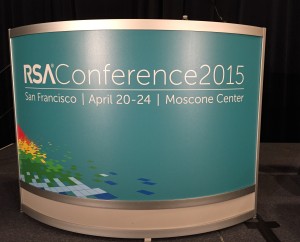 CHANGE IS ON THE MENU AT RSA 2015
CHANGE IS ON THE MENU AT RSA 2015
_________________________________________________
Article click here : Royalty Meets Luxury in Switzerland
__________________________________________________________
This very interesting article was written by our colleague Mihaly Nagy Senior Adviser to the Minister of State for Culture, Ministry of Human Resources Hungary.
FULL ARTICLE: SEVSO TREASURE
Scientists think the SEVSO TREASURE (the protagonist of this story) is the biggest and most important hoard form Late Antiquity. Unfortunately it was not discovered by trained professionals, and only a part of it is accessible to the public. Lord Colin Renfrew had characterised its recent history a “tale of greed and irresponsibility”.
THE FUTURE BELONGS TO HEPTA ENTREPRENEURS
THE 7 EXCELLENCES OF GLOBAL INNOVATORS
________________________________________________________
MUNICH FILM FESTIVAL 2014:
THE SUNDANCE OF EUROPE WHERE HOFBRÄUHAUS MEETS PULP FICTION
| Author: Ina von Ber | La Jolla, CA, 07/15/2014, |
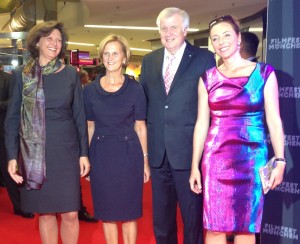
Bavarian Minister of State Ilse Aigner, President Horst Seehofer, Mrs. Karin Seehofer, Festival Director Diana Iljne
USPA NEWS - During the past eight days around 160 films from over 50 countries were on display at the Munich FilmFest 2014. Multiple Oscar winners, directors, starlets, film producers, the Munich-based fashion designer and filmmaker Willy Bogner, adorned the Red Carpet in the fashionable Hofbräuhaus city.

SUMMARY OF THE WORLD DIPLOMATIC FORUM2014
Education is a global concern and, in some areas of the world, it faces an uncertain future. At the recent World Diplomatic Conference hosted by the Rady School of Management in partnership with the Ambassadorial Roundtable, UC San Diego Chancellor Pradeep K. Khosla advised universities to build strong, global educational infrastructures or risk the future of effective learning.
Chancellor Khosla was just one of many high profile attendees at last week’s 2014 World Diplomatic Conference held on campus. The goal of the conference was to connect the international diplomatic community, business organizations and academia to form valuable networks and achieve critical development goals sought by the international community.
Attendees included several international leaders representing countries including Macedonia, Bolivia, New Zealand, Guatemala, Turkey and Bosnia Herzegovina. Also in attendance were business leaders and industry experts including Nico Sell with Wickr, Nathan Fletcher with Qualcomm, Eduardo Orenes with the Spanish Navy and Igor Pasternak with Aeroscraft Corporation. Each of these individuals was given the opportunity to present their country’s triumphs, offer expert advice on possible shortcomings and collaborate on possible solutions to key global issues.
Future educational strategies and cybersecurity tactics remained common threads tying together the international community and educational leaders throughout this two-day event. Chancellor Khosla, as the educational tracks chair, led a discussion about the future of education and the future implications to present-day educational infrastructures.
Throughout his examination of the current state of education, Khosla mentioned that educational institutions should be run as enterprises through strategically formulated and retainable visions that are sustainable, international and multifaceted. He offered three key components of an effective educational institution in his talk, including: high-quality faculty, problem-solving acquisition and a non-cookie cutter learning experience.
During a subsequent educational roundtable discussion, Khosla stressed the importance of producing graduates who are well educated and remain lifelong students who can seamlessly interact in a multinational environment. Khosla said he views universities as being drivers of the economy and used Google as an example. Google began as a university research project between two Ph.D. students and is today one of the most successful companies in the world.
“All it takes is one great innovator to create thousands of jobs for people worldwide,” said Khosla.
“I believe freedom of thought and a hunger for knowledge remain important aspects to fostering innovation in education,” said Consul General of New Zealand Leo Griece during the roundtable.
The World Diplomatic Forum also explored a topic of intense importance to governments, universities and the public: cybersecurity. A panel consisting of industry experts including Karl Frederick Rauscher, ambassador and chief architect for cybersecurity policy, Institute for Electrical and Electronics Engineers (IEEE); privacy expert Nico Sell, Wickr CEO; and security expert Dr. Parag Pruthi, Niksun CEO, discussed smart strategies to secure critical communication.
“No technology is perfect” said Sell, who, as a hacker herself, recommended befriending the hacker as opposed to penalizing them. Her suggestions to the international community revolved around keeping your identity safe by utilizing separate phones for different functions, speaking in code and putting out incorrect information into the digital sphere.
Spanish Navy Cryptology Chief Eduardo Orenes later agreed in his own discussion that the private sector should be placing a greater emphasis on cybersecurity since we’re in a time where cybertechnologies encompass our lives on a daily basis.
Nathan Fletcher, senior director of corporate development at Qualcomm Technologies Inc., focused on the upside of technological progress. He introduced the power of mobile technologies by saying, “We have the Apollo in our pockets,” referring to the technology used in the 1960’s in the Apollo Spacecraft. He emphasized that mobile technologies have the ability to connect the world in unimaginable ways and envisions a society where one day even the refrigerator will have the ability to warn you that you’re dehydrated.
“No matter what aspect of life we look at, mobile technology has transformative change,” said Fletcher.
The conference served as a hub for multinational and multicultural individuals to address issues that affect many societies globally on a daily basis. Whether it was Igor Pasternak sharing his revolutionary airship technology with Aersocraft or Chancellor Khosla sharing his philosophy on education with Macedonia’s ambassador, international connections were created at the World Diplomatic Forum that could help solve some of the world’s most pressing problems.
________________________________________________________________________
WORLD DIPLOMATIC FORUM, 2014: SELECTION OF SUMMARIES OF FORUM ADDRESSES
THURSDAY, MAY 8 2014
WELCOME REMARKS FROM :
CALIFORNIA CONGRESSMAN SCOTT PETERS
SAN DIEGO COUNTY BORD OF SUPERVISORS DAVE ROBERTS
AMBASSADOR OF MACEDONIA, ZORAN JOLEVSKI
- Bill Pavleski, Minister of Foreign Investment Macedonia, spoke to diplomacy as it relates to competitiveness. He noted how globalization has dramatically changed both diplomacy and how companies compete. Search for new markets is now highly coordinated with diplomacy. Emerging markets, in particular, are a focus of this. The trust issue is paramount and takes time in the connectivity of diplomacy and markets. Supply chain management at both macro and micro levels is crucial especially as it relates to work force development and cybersecurity. Persistence is key in the government-business connection.
- Karl Rauscher, Ambassador IEEE , Nico Sell, CEO WICKR and Parag Pruthi, PhD CEO NIKSUN, spoke to cybersecurity in relation to embassy-level communication. Information technological developments have transformed everything. Reliability and security are intrinsically connected. Therefore, cybersecurity can facilitate diplomacy. The strategic calculus includes the emphasis and synergy of three factors: robustness, privacy and security. High communication traffic in crises can be managed without large investments since software modifications are typically effective. There was a concentration on the core importance of ethical dimensions in cybersecurity especially since chaos theory can apply to communication and hacking is omnipresent and easy to do. No system can be 100% effective in guaranteeing security. Thus the need to anticipate the inevitable breaches though continuous measurement and monitoring though multiple layers. Incentivizing disclosure of holes in systems should be attempted even if it seems to reward hackers.
- Chancellor of UCSD Pradeep Khosla, PhD, spoke to the future of higher education emphasizing that government research is the key to economic development, and the United States is unusually good at this. He emphasized that China and India, even with large financial investments in higher education, do not have the infrastructure of Ph.D.’s to sustain a strong research to enterprise connection. Many resources are wasted in these countries particularly if rules proliferate and corruption accelerate
- COUNTRY HIGHLIGHTS PRESENTED BY:
- H.E. Elena Potodorova Ambassador of Bulgari
- H.E. Jadranka Negodic Ambassador of Bosnia Herzegovina
- H.E Zoran Jolevski, Ambassador of Macedonia
- Assembly Woman Shirley Weber, PhD briefly welcomed the group to California and spoke to the importance of global citizenship.
FRIDAY, MAY 9 2014
- Igor Pasternak, CEO of Aeroscraft presented on the design and manufacturing of lighter-than-air (LTA) aircrafts which he spearheaded since its inception more than 25 years ago. Today, the Aeroscraft Corporation (Aeros) is the world’s most innovative FAA-certified LTA manufacturing company with products used globally for military and commercial applications, including the non-rigid Aeros 40D Sky Dragonairship, advanced tethered aerostatic systems and portable communications and surveillance towers. Pasternak is also the innovator of the Aeroscraft.
- Nathan Fletcher , Senior VP global operations Qualcomm Technoolgies spoke to the latest innovations in the connectivity of transformative technologies especially as they related to health, education and smart cities. Rates of change have increased markedly. What took thousands of years to change transportation, for example, now only takes one or two human generations. Connectivity, then, is both exponential and generational. The posibilites are almost limitless but there still needs to be attention to balance and ethics in the process.
- Eduardo Orenes Chief LT Spanish Navy spoke to cyberdiplomacy in the private sector. He emphasized the ease of sniffing and hacking and thus the more accurate term is “cyberinsecurity” rather than cybersecurity. Lack of encryption not only makes it incredibly easy to sniff and hack but can transform benign web sites into attack platforms. Since cybersecurity is not yet a priority in the private sector, vulnerabilities to reputation loss are huge. “Infosurance” and digital common sense are both required if we are going to homogenize the security levels of both private and public sectors. Diplomacy can help lead the private sector in this homogenizing effort.
COUNTRY HIGHLIGHTS PRESENTED BY:
H.E. Leon Grice Consul General of New Zealand
- Chancellor of UCSD Pradeep Khosla addressed the Future of Global Education in a roundtable table session with Ambassador Dennis Hays, Minister of Foreign Investment of the Republic of Macedonia Bill Pavlevski, Ambassador Zoran Jolevski, and Ambassador Jadranka Negodic of Bosnia Herzegovina.
Respectfully submitted,
Patrick Drinan, Ph.D.
Dean ( ret) & Professor Emeritus University of San Diego, CA
_________________________________________________________________________
The World Diplomatic Forum
April 8, 2014
by Johannes A.A.M. van Gorp
 We are living in an increasingly interconnected world. Whether it is a tsunami in Japan, or an uprising in the Ukraine, both have very real consequences not just for the people that live in those societies, but for all around the world. Take the March 2011 earthquake, tsunami and nuclear crisis that hit Japan. Not only was the loss of life staggering and the material damage suffered by Japan immense – it is estimated that about half a percentage point of global economic growth was lost that year.[1]Similarly, the managing director of the IMF, Christine Lagarde, predicted that recent tensions between Russia and the West over the Ukraine were likely to negatively impact an already slow economic recovery.[2] Put another way: these events have repercussions not just for the countries they impact, but for business here in the U.S. as well.That is why diplomacy is more important than ever. It matters for businesses here in Southern California, especially for multinationals that have a global presence. Successful diplomacy does not just defuse crisis when they arise, but manages day to day interstate relations. Ambassadors are also able to explain what investment opportunities exist in their countries and can serve as liaisons between companies here in the U.S. and their home country – both qualities that matter to businesses.That is why it is so exciting that The Ambassadorial Roundtable was founded here in San Diego in 2005. Headed by Dr. Ina von Ber, its mission is to connect international capital, businesses, academia, and government representatives with access to high level foreign dignitaries and diplomats. In January of this year, this organization brought Zoran Straveski, the Deputy Prime Minister of the Republic of Macedonia, Bill Petroviski, the Foreign Investment Minister of the Republic of Macedonia, and Zoran Jolevski, the Ambassador of the Republic of Macedonia to the United States, to San Diego. While here they met with community and business leaders and gave a presentation on the business climate in the Republic of Macedonia. Similarly, in September 2013 Ashok Kumar Mirpuri, the Ambassador of Singapore to the United States, was invited to meet with members of the Ambassadorial Roundtable in La Jolla, CA to discuss business opportunities in Singapore.The Ambassadorial Roundtable’s largest annual meeting, the World Diplomatic Forum Conference, is set to take place May 8-9, 2014 here at the Rady School of Management. Bringing together dozens of diplomats, business leaders and academics, this conference is modeled on the World Economic Forum that takes place annually in Davos, Switzerland. With a focus on international diplomacy, it seeks to replicate a similar experience as the one in Davos here in San Diego, CA. With a keynote address to be held each morning, participants in the afternoon will break off into group to discuss a variety of pertinent issues in a more intimate setting: education, diplomacy and globalization, healthcare, cyber security and IT, bio-pharm and clean-tech, tourism and hospitality, and government, defense and aerospace.Through bringing together this many foreign dignitaries and business leaders, this two day conference offers amazing networking opportunities unique to Southern California. It shouldn’t be missed!Dr. Johannes van Gorp is a Lecturer of Political Science at the University of California, Riverside and specializes in West European Politics. In the past he worked as a Visiting Assistant Professor of Politics at Occidental College and was a Postdoctoral Fellow at the European Union Centre of Excellence at York University, Canada. He received his Ph.D. in Political Science from Boston University and also holds an M.A. in European Studies from New York University and a B.A. in History and International Affairs from Lafayette College
We are living in an increasingly interconnected world. Whether it is a tsunami in Japan, or an uprising in the Ukraine, both have very real consequences not just for the people that live in those societies, but for all around the world. Take the March 2011 earthquake, tsunami and nuclear crisis that hit Japan. Not only was the loss of life staggering and the material damage suffered by Japan immense – it is estimated that about half a percentage point of global economic growth was lost that year.[1]Similarly, the managing director of the IMF, Christine Lagarde, predicted that recent tensions between Russia and the West over the Ukraine were likely to negatively impact an already slow economic recovery.[2] Put another way: these events have repercussions not just for the countries they impact, but for business here in the U.S. as well.That is why diplomacy is more important than ever. It matters for businesses here in Southern California, especially for multinationals that have a global presence. Successful diplomacy does not just defuse crisis when they arise, but manages day to day interstate relations. Ambassadors are also able to explain what investment opportunities exist in their countries and can serve as liaisons between companies here in the U.S. and their home country – both qualities that matter to businesses.That is why it is so exciting that The Ambassadorial Roundtable was founded here in San Diego in 2005. Headed by Dr. Ina von Ber, its mission is to connect international capital, businesses, academia, and government representatives with access to high level foreign dignitaries and diplomats. In January of this year, this organization brought Zoran Straveski, the Deputy Prime Minister of the Republic of Macedonia, Bill Petroviski, the Foreign Investment Minister of the Republic of Macedonia, and Zoran Jolevski, the Ambassador of the Republic of Macedonia to the United States, to San Diego. While here they met with community and business leaders and gave a presentation on the business climate in the Republic of Macedonia. Similarly, in September 2013 Ashok Kumar Mirpuri, the Ambassador of Singapore to the United States, was invited to meet with members of the Ambassadorial Roundtable in La Jolla, CA to discuss business opportunities in Singapore.The Ambassadorial Roundtable’s largest annual meeting, the World Diplomatic Forum Conference, is set to take place May 8-9, 2014 here at the Rady School of Management. Bringing together dozens of diplomats, business leaders and academics, this conference is modeled on the World Economic Forum that takes place annually in Davos, Switzerland. With a focus on international diplomacy, it seeks to replicate a similar experience as the one in Davos here in San Diego, CA. With a keynote address to be held each morning, participants in the afternoon will break off into group to discuss a variety of pertinent issues in a more intimate setting: education, diplomacy and globalization, healthcare, cyber security and IT, bio-pharm and clean-tech, tourism and hospitality, and government, defense and aerospace.Through bringing together this many foreign dignitaries and business leaders, this two day conference offers amazing networking opportunities unique to Southern California. It shouldn’t be missed!Dr. Johannes van Gorp is a Lecturer of Political Science at the University of California, Riverside and specializes in West European Politics. In the past he worked as a Visiting Assistant Professor of Politics at Occidental College and was a Postdoctoral Fellow at the European Union Centre of Excellence at York University, Canada. He received his Ph.D. in Political Science from Boston University and also holds an M.A. in European Studies from New York University and a B.A. in History and International Affairs from Lafayette College[1] Nanto, Dick K., William H. Cooper, J. Michael Donnelly and Renée Johnson (2011). Japan’s 2011 Earthquake and Tsunami: Economic Effects and Implications for the United States. Washington, DC: Congressional Research Service
[2] Giles, Chris and Michael MacKenzie (2014). “Stock markets hit post-crisis highs as IMF warns on growth,” Financial Times. April 2
Originally published by Rady School of Management /permission obtained by Amb.RT
________________________________________________________________________
"Investing in Macedonia:High-Powered Macedonian Delegation Visits San Diego”
By Johannes A.A.M. van Gorp, Ph.D. On January 20th, 2014, The Ambassadorial Roundtable was the official host of a distinguished Macedonian delegation that visited San Diego as part of their West Coast tour. Consisting of Zoran Straverski, the Deputy Prime Minister and Minister of Finance, Bill Petrovski, the Minister of Foreign Investment, and H.E. Zoran Jolevski, the Ambassador of Macedonia to the United States, this delegation made a compelling case to invest in their country to a select group of business and community leaders invited to a luncheon held at the Embassy West organized by The Ambassadorial Roundtable. After Dr. Ina von Ber gave a warm welcome to the delegation, Ambassador Jolevski introduced Deputy Prime Minister Straverski to those gathered. The Deputy Prime Minister gave a brief overview as to why investing in Macedonia would be an attractive proposition for many an American company. Even though Macedonia is not a member of the European Union – its membership negotiations are currently being held up by Greece over a name dispute – Macedonia has signed free trade agreements with the European Union. It also has similar agreements with the states surrounding it. Accordingly, goods produced in Macedonia have access to a free-trade market consisting of more than 650 million people. Especially reforms implemented by the Macedonian government over the last two decades have managed to make the country an attractive destination for foreign investors. For example, the country has one of the lowest tax rates in the world: a flat-tax rate of 10% for corporations, which is even lower if profits are reinvested back into the country to grow ones business. Technological Industrial Development Zones have also been created in which foreign investors are given a 10 year tax exempt status and land can be leased for 99 years at a rate of 10 Euro Cents/m2. The workforce is also an increasingly educated one: the government annually spends about 5 to 6% of GDP on education and children begin learning English in first grade. Finally, conservative fiscal policy has ensured that Macedonia’s public debt only equal 34% of GDP. According to the Deutsche Bank, Macedonia as a result of these reforms now ranks 25th in the world when it comes to the ease of doing business. Additionally, despite the financial crisis wreaking havoc on most of Europe’s economies, the Macedonian economy has managed to average an annual growth of 3% since 2009 (it averaged 5 to 6% before the crisis). After the Deputy Prime Minister’s talk, Bill Petrovski, the Minister of Foreign Investment, gave a twenty minute presentation that went into more depth as to why investing in Macedonia would be attractive for American companies. He made clear that because of Macedonia’s strategic location and investments in infrastructure, goods could be delivered to more than 650 million consumers in less than 24 hours. Despite a highly educated workforce, wages in Macedonia are also much more competitive than those of its neighbors. As made shown through several case studies, Macedonia accordingly has managed to convince companies like Van Hool, Johnson Matthey, and Kemet to invest in the country. Bottom line: the Former Yugoslav Republic has managed to transform itself into a dynamic economy in a relatively short time.